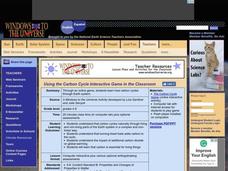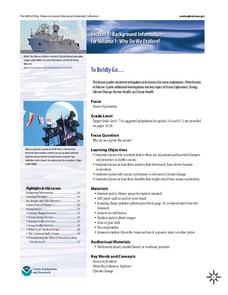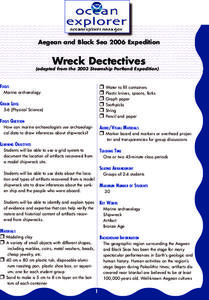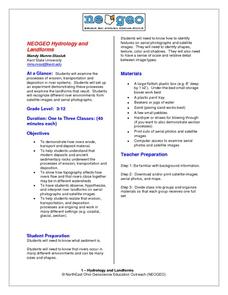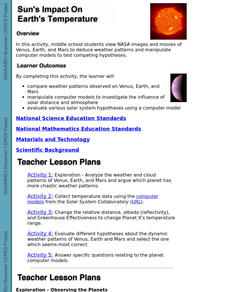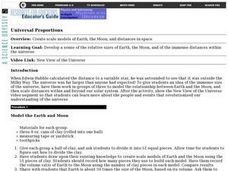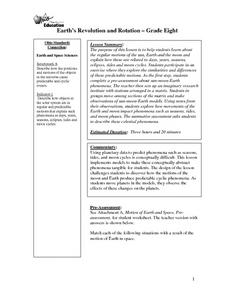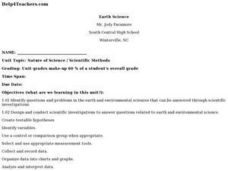Curated OER
Black Holes....II
In this black hole instructional activity, students use the equation for time dilation to solve 8 problems including determining the time it takes to receive a GPS signal from space, the time delay for the GPS-Earth system, the distance...
Curated OER
Our Ethics Show: Learning to Master
Students explore the concept of philanthropy. In this service learning lesson, students create an action plan as pairs study a number of texts dealing with Jewish perspectives on the mastery of the earth. They then determine how these...
Curated OER
Using the Carbon Cycle Interactive Game in the Classroom
An online reading and interactive game bring the path of a carbon molecule to life for your earth science explorers! As an assessment, learners can map out or write about their experience in the carbon cycle. Thoroughly written...
Science Matters
Thermal Energy Flow in Materials
The sun sends the earth 35,000 times the amount of energy required by all of us on the entire planet, every day. The fourth activity in the 10-part series looks at how light energy from the sun transfers into thermal energy. Scholars...
NOAA
To Boldly Go...
When we think of ocean exploration, many of us have visions of sunken pirate ships full of treasure or mysterious creatures of the deep. What really motivates deep-sea investigation? The first in a series of diverse six-part lessons...
NOAA
What's the Big Deal?
Who knew that a possible answer to Earth's energy resource problems was lurking deep beneath the ocean's surface? Part four of a six-part series introduces Earth Science pupils to methane hydrate, a waste product of methanogens. After...
Curated OER
Learning from Light: The Big Bang
Students explore what astronomers are able to examine our galaxy and universe by examining light. They explore in this sub-unit the formation of the universe, commonly called "The Big Bang," and it follows studying from the Light: The...
Curated OER
Sandscapes to Landscapes
Students explore landscapes and create their own in a creative project.
Curated OER
Wreck Detectives
Junior archaeologists examine types of artifacts from the Bronze Age on the internet. In collaborative groups, they create a story about a ship from this period and then construct a model of the ocean floor after their ship has sunk....
NorthEast Ohio Geoscience Education Outreach
Hydrology and Landforms
Three days of erosion exploration await your elementary geologists. Learners begin by examining rivers via Google Earth, then they model water flow in sand, and finally, they identify resulting landforms. This lesson is written...
Curated OER
Sky Watching
Students complete night-sky observations to understand how our knowledge of the sky has been enhanced by telescopes. Students complete a timeline worksheet giving the history of telescopes. Students then then make their own observations...
Curated OER
Our Solar System
Students study the Earth and Solar System through a variety of activities. They compile a coloring book show the characteristics of the Sun and nine planets.
Curated OER
Our Solar System
In this solar system learning exercise, students read about the planets, asteroids, meteoroids, comets, and the moon. Then students complete 25 multiple choice, 4 true or false, and 3 short answer questions.
Curated OER
Mercury, Venus, and Earth
Students learn information about the planets Mercury, Venus, and Earth by playing a trivia game.
Curated OER
The Earth-Moon System
In this Earth and moon worksheet, students will review the different phases of the moon, how eclipses are created, and how the moon influences tidal patterns. This worksheet has 13 fill in the blank, 8 true or false, and 2 short answer...
Curated OER
Sun's Impact On Earth's Temperature
Students view NASA images and movies of Venus, Earth, and Mars to deduce weather patterns and manipulate computer models to test competing hypotheses. They manipulate computer models to investigate the influence of solar distance and...
Curated OER
Eratosthenes And Radius of the Earth
Students calculate the radius of the earth. They use the method and data suggested by Eratosthenes. They investigate the interrelationships among mass, distance, force, and time through experimental processes.
Curated OER
Earth Kids: Kindergarteners Taking Care of the Earth
Students explore a variety of ways of how to care for the environment in the nine lessons of this unit. They observe how to be responsible "Earth Kids."
Curated OER
Universal Proportions: Earth and Moon
Learners create scale models of Earth, the Moon, and the distances within the universe. Working in groups, they construct their models of Earth and the Moon on a scale of 50:1 and calculate how far apart to place their models. They...
Curated OER
Earth's Revolution and Rotation
Eighth graders investigate the regular motions of the sun, Earth and the moon and explain how these are related to days, years, seasons, eclipses, tides and moon cycles. They participate in an exercise where they explore the...
Curated OER
Our Solar System
Students analyze the theories of the formation of the universe and solar system. Students analyze planetary motion and the physical laws that explain that motion: Rotation, Revolution, Apparent diurnal motions of the stars, sun, and...
Curated OER
How Can We Locate Specific Places On Earth?
Second graders discover how to use longitude and latitude to locate specific sites on Earth. They compare old and new ways of locating specific places, and discover how latitude and longitude coordinates are used to locate places on Earth.
Curated OER
Who Am I? / The Solar System
In this science worksheet, students answer the trivia questions that focus upon various planets of our solar system. They also define what a star is.
Curated OER
Earth Science/ Scientific Methods
Students identify questions and problems in the earth and environmental sciences that can be answered through scientific investigations. They design and conduct scientific investigations to answer questions related to earth and...
Other popular searches
- Earth System Origins
- 4 Major Earth Systems
- Moon Earth System
- Earth Systems Unit
- Major Earth Systems
- Earth Systems Interactions
- Sun Earth Moon System
- Earth Systems Global Winds
- Earth Systems 3209
- Earth Systems Science
- Earth Systems and Patterns
- Earth System Atmosphere




